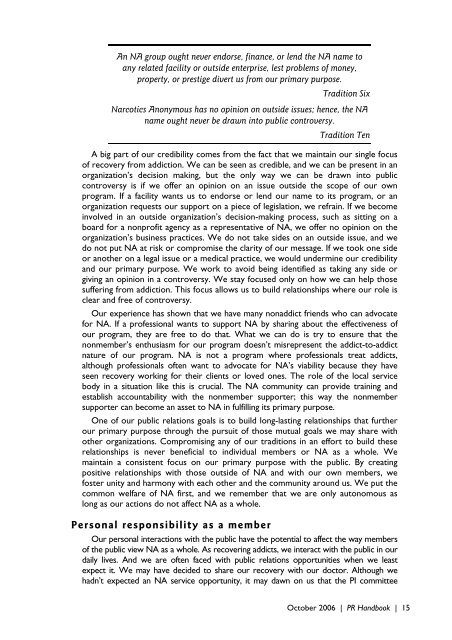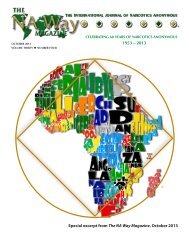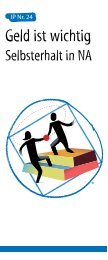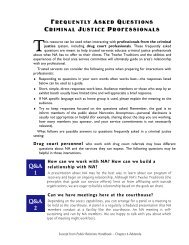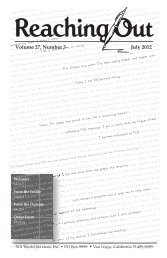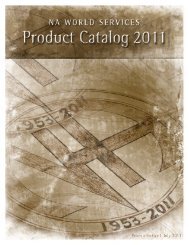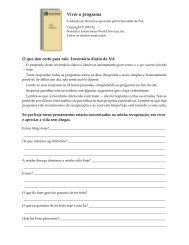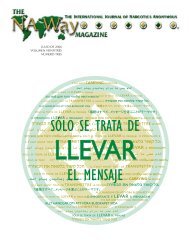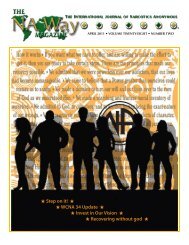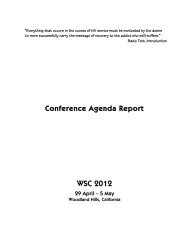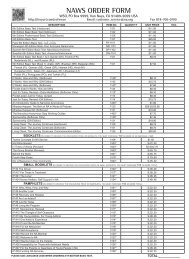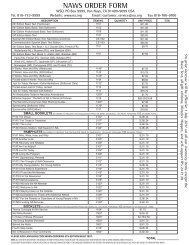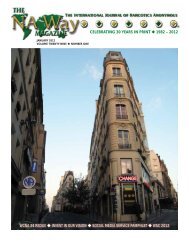Public Relations Handbook - Narcotics Anonymous
Public Relations Handbook - Narcotics Anonymous
Public Relations Handbook - Narcotics Anonymous
Create successful ePaper yourself
Turn your PDF publications into a flip-book with our unique Google optimized e-Paper software.
An NA group ought never endorse, finance, or lend the NA name toany related facility or outside enterprise, lest problems of money,property, or prestige divert us from our primary purpose.Tradition Six<strong>Narcotics</strong> <strong>Anonymous</strong> has no opinion on outside issues; hence, the NAname ought never be drawn into public controversy.Tradition TenA big part of our credibility comes from the fact that we maintain our single focusof recovery from addiction. We can be seen as credible, and we can be present in anorganization’s decision making, but the only way we can be drawn into publiccontroversy is if we offer an opinion on an issue outside the scope of our ownprogram. If a facility wants us to endorse or lend our name to its program, or anorganization requests our support on a piece of legislation, we refrain. If we becomeinvolved in an outside organization’s decision-making process, such as sitting on aboard for a nonprofit agency as a representative of NA, we offer no opinion on theorganization’s business practices. We do not take sides on an outside issue, and wedo not put NA at risk or compromise the clarity of our message. If we took one sideor another on a legal issue or a medical practice, we would undermine our credibilityand our primary purpose. We work to avoid being identified as taking any side orgiving an opinion in a controversy. We stay focused only on how we can help thosesuffering from addiction. This focus allows us to build relationships where our role isclear and free of controversy.Our experience has shown that we have many nonaddict friends who can advocatefor NA. If a professional wants to support NA by sharing about the effectiveness ofour program, they are free to do that. What we can do is try to ensure that thenonmember’s enthusiasm for our program doesn’t misrepresent the addict-to-addictnature of our program. NA is not a program where professionals treat addicts,although professionals often want to advocate for NA’s viability because they haveseen recovery working for their clients or loved ones. The role of the local servicebody in a situation like this is crucial. The NA community can provide training andestablish accountability with the nonmember supporter; this way the nonmembersupporter can become an asset to NA in fulfilling its primary purpose.One of our public relations goals is to build long-lasting relationships that furtherour primary purpose through the pursuit of those mutual goals we may share withother organizations. Compromising any of our traditions in an effort to build theserelationships is never beneficial to individual members or NA as a whole. Wemaintain a consistent focus on our primary purpose with the public. By creatingpositive relationships with those outside of NA and with our own members, wefoster unity and harmony with each other and the community around us. We put thecommon welfare of NA first, and we remember that we are only autonomous aslong as our actions do not affect NA as a whole.Personal responsibility as a memberOur personal interactions with the public have the potential to affect the way membersof the public view NA as a whole. As recovering addicts, we interact with the public in ourdaily lives. And we are often faced with public relations opportunities when we leastexpect it. We may have decided to share our recovery with our doctor. Although wehadn’t expected an NA service opportunity, it may dawn on us that the PI committeeOctober 2006 | PR <strong>Handbook</strong> | 15


